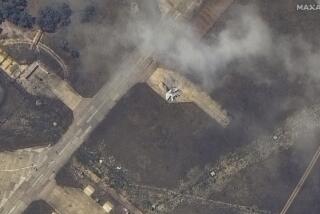The Other Suicide Bombers
The suicide bombings we hear most about these days are in the Middle East, but the nation in which such atrocities have occurred most often in the last two decades is Sri Lanka. Over that time, a Tamil terrorist group in the island nation off the southern tip of India has sent out more than 200 teenagers with explosives-filled suitcases or belts, slaughtering perceived enemies and innocents alike. The victims include a president of the nation, Cabinet ministers and a former prime minister of India.
Since March, the killings have mostly stopped, thanks to a Norwegian-brokered cease-fire. Peace talks may begin in a few weeks, offering hope to a country exhausted by more than 64,000 deaths since the separatist violence first surged in the nation of 20 million. The cease-fire is the most promising sign in years. However, past agreements to stop the violence collapsed, and this opening will need careful tending.
Prime Minister Ranil Wickremesinghe won election last December on a platform promising to negotiate with the guerrillas commonly known as the Tamil Tigers. The group has sought autonomy or independence for areas in the north and east of Sri Lanka that are home to most of the country’s Tamils, who make up nearly 20% of the population. Nationalist elements of the Sinhalese, the majority ethnic group, oppose talks with the Tigers. But the stalemate that has developed between the warring forces demonstrates that negotiations are needed to forestall many more years of bloodshed.
Sri Lanka’s president, Chandrika Kumaratunga, was unsuccessful in trying to make peace with the Tigers eight years ago but has carped at Wickremesinghe’s attempts. Her objections have the aura of political posturing aimed at gaining advantage over the prime minister, who is from a different party. Kumaratunga should support Wickremesinghe in the peace process. There would be ample credit due both politicians if the violence ended.
The founder of the Tigers, Velupillai Prabhakaran, insists that he is committed to the peace process, but he has reneged on agreements in the past. His group has been designated a terrorist organization by several nations, including the United States. Washington should keep reminding Prabhakaran that if he resumes his murderous ways he could become a target of the war on terror. Prabhakaran’s best course is to continue working with the Sri Lankan government for concrete steps such as opening roads and ending the use of schools as bases for soldiers or guerrillas.
To help peace talks succeed, the government should rescind its order making the Tigers an illegal organization. Then, as talks begin, it will be important to reach agreement on what kind of interim government will be put in place in Tamil areas.
More to Read
Start your day right
Sign up for Essential California for news, features and recommendations from the L.A. Times and beyond in your inbox six days a week.
You may occasionally receive promotional content from the Los Angeles Times.






